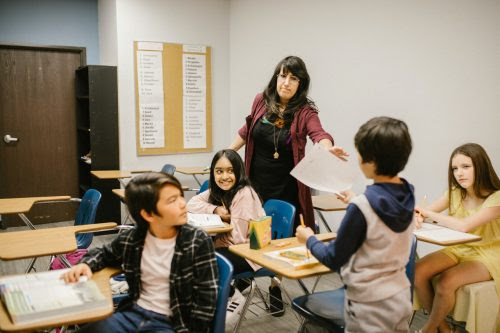
Working with students who have disabilities is not as complicated as people on the outside might assume. Most are intelligent, capable students who are held back in a very specific, often individualized way.
Special education counselors routinely find that their students with disabilities are very ready to engage with their services. Still, preparation is key. In this article, we take a look at how school counselors can work effectively with students who have disabilities.
You Need to Challenge Your Assumptions
To say that working with students who have disabilities is easy would be a mischaracterization. These students are struggling and they do require unique attention. But what else is new in the world of a school counselor?
Here’s what’s true: The vast majority of special ed students do not have disabilities that would be apparent to anyone who wasn’t (as an example) trying to give them a reading test.
There is a reasonably high chance that your experience working with a student who has a disability won’t be meaningfully different than working with any other kid.
You should not:
- Assume anything about their disability.
- Take them less seriously because they are enrolled in Special Ed.
- Disregard other factors that might be more relevant to what you are seeing them for.
Students are multifaceted. While you should be aware of their disability, you should not necessarily assume that it is the primary thing that needs to be focused on.
That said, there are some things you can (and in fact, may legally be required) to do on the front end to make sure the experience goes well.
Consult the IEP
Consulting with the student’s individual education plan is not only a legal requirement but also a great way to really understand where they are coming from. These documents lay out as many details about their disability and educational trajectory as possible.
They aren’t perfect—teachers make mistakes and the information is not always perfectly up to date, but it is the best possible starting point.
And while IEP accommodations are generally specific to classroom situations, understanding them will potentially give you insights into how to work effectively with this student.
Understand the Disability
Some disabilities involve sensory sensitivity. You can help the child feel more comfortable by making (relatively) simple accommodations in the space where you will be meeting with them. One of the best ways to gain insights into what learning environment will work best for the student?
Their teacher! Special education teachers create and communicate specialized accommodations for all of their students. Most of them will be thrilled to answer your questions.
Collaborate as Much as Possible
Schools are always collaborative environments and this is perhaps uniquely true when working with students in the special education program. There are simply more people involved in their education.
In addition to speaking with their SPED teacher, talk also to their homeroom instructor, and anyone else who regularly comes into contact with the student.
Also, make sure to fully involve the student’s parents/ guardians. Where appropriate, give them the opportunity to attend the meeting. When that isn’t possible, make sure they remain in the loop. Call them afterward. Send an email summarizing your insights. Make sure they are comfortable with the direction of their child’s education.
No, parents do not get to call all the shots. Yes, their opinions matter. Sometimes it can be hard to balance what the parent wants with what you know about education. Nevertheless, it’s important to remember that parental involvement is ultimately always a good thing.
How Schools Can Help All Students Succeed Through Counselling
As we’ve mentioned throughout this article, a student’s disability will not usually be the most relevant factor in determining their educational outcomes. It’s all about how the school system rises to meet the challenges of ALL its students.
The quality of leadership from the top down can make a big difference. Schools with lean, effective administrative teams will likely produce better systems of learning for the entire student body.
Continuing education initiatives can help. Most people working within a school system are required to participate in some professional development. This could mean attending lectures, completing coursework, attending conferences, and so on.
As a counselor, you might focus on how modern technological breakthroughs can help advance the quality of your services. For example, AI is now being used in schools to better process data and deliver insights. This could potentially be a good way to take a more comprehensive view of your student’s needs.
Personalization is the best way to reach any student. Schools, at all stages of the educational process, should be looking for ways to meet the individual needs of everyone in the student body. That’s a policy-level decision.
As a counselor, you can also just make it your mission to see what’s in front of you. Avoid assumptions. Listen. The tightrope walk of your job as a counselor is to understand who your student is on paper, but also to not let that understanding get in the way of who they reveal themselves to be through your sessions.
It’s a tough job, but completely worthwhile to the person who is passionate about counseling.
Mariam holds an MS in Sociology with a specialization in Medical Sociology and Social Psychology. With a strong academic background and extensive research work in both fields, she brings depth and clarity to complex topics. Her writing explores the intersection of society, health, and the human mind, making academic ideas easy to grasp and relevant to everyday life.


